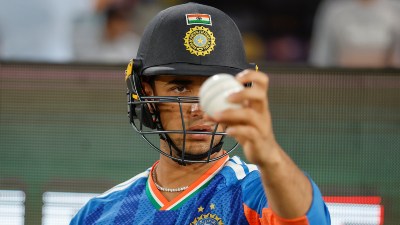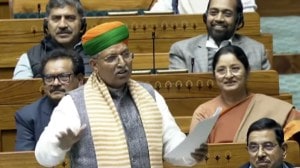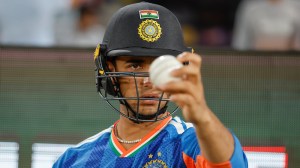100 Short Stories, edited by AJ Thomas, offers an insight into the languages, themes and styles practised since the 19th century
The volume is an ambitious effort to bring together work by India's best writers across centuries, such as Rabindranath Tagore, Fakir Mohan Senapati, Vimla Devi and Ismat Chughtai
 Kalki and Rabindranath Tagore (Photos: Wikimedia Commons)
Kalki and Rabindranath Tagore (Photos: Wikimedia Commons)“A great short story reveals a moment of truth,” writes Ruskin Bond while introducing this anthology of a hundred Indian short stories ably edited by AJ Thomas. As the book’s cover declares, it turns out to be a feast of remarkable short fiction spanning three centuries. These stories begin in the 19th, go on to the 20th and end with two decades of the 21st century. Bond likens the short story to a “flash of lightning.” For those of us who happen to live in the hills of Landour, we are fortunate to have seen lighting — both forked and sheet — light up many a dark monsoon night. Then comes the roll of distant thunder. But you don’t have to worry because it is merely the applause as you exit a stadium. Other writers, too, have found this ridge bristle with lightning: John Lang, the Australian-born author who spent his last years up here, found: “This place and the Cape of Good Hope” are the best places in the world to see the display of lightning.
This must be the biggest and most ambitious collection of Indian short fiction ever seen together between the covers of a single volume. This monumental anthology brings a 100 years of the country’s finest writers. Starting with grand masters like Rabindranath Tagore’s ‘Kabuliwala’ and the Odia writer Fakir Mohan Senapati’s ‘Rebati’ from the 19th century, the book moves through the 20th century gathering the best that the greats offered before those of the twenty-first century’s lights lit up the firmament.
To this banquet, the book brings the best in any Indian language, region, generation and literary tradition. A hundred and more years later, still fresh is Tagore’s stunning ‘Kabuliwalla’, considering that it was first published in 1898. In the early decades of the 19th century, in 1925, Kalki’s offering ‘The Governor’s Visit’, was first published in the magazine Navashakti by a nationalist and freedom fighter. He was jailed thrice during the Indian National Movement for freedom. It has been translated from the Tamil by Gowri Ramnarayan.
Vimala Devi is the pseudonym of Teresa de Piedade Almeida — the Goan who was born into a landed family and settled in Barcelona. Her story ‘Job’s Children’ has been translated from Portuguese by Paul Melo e Castro. Or you can meet OV Vijayan, whose story ‘The Hanging’ takes you to the hanging alongside the father at his son’s hanging. Courtesy Geeta Kapur, the translator, you meet Nirmal Verma, a pioneer of the Nayi Kahani, in ‘Mirror of Illusion’. In perma-election mode, you have Ismat Chughtai’s ‘Of Fists and Rubs’, translated from Urdu by Mohammed Umar Memon. But often, these translators get little credit for the fine job they do in finding the ‘exact’ word.
They are gifted lovers of literature who have sat up, often through lonely nights, to bring countless stories from Indian languages to readers around the world. And no artificial intelligence or ChatGPT to help them either. This book celebrates and exhibits our literary wealth — it salutes our lesser-known translators — without them, the book would be as pointless as a blank sheet of paper.
Saili is an author, photographer and illustrator
- 01
- 02
- 03
- 04
- 05






























